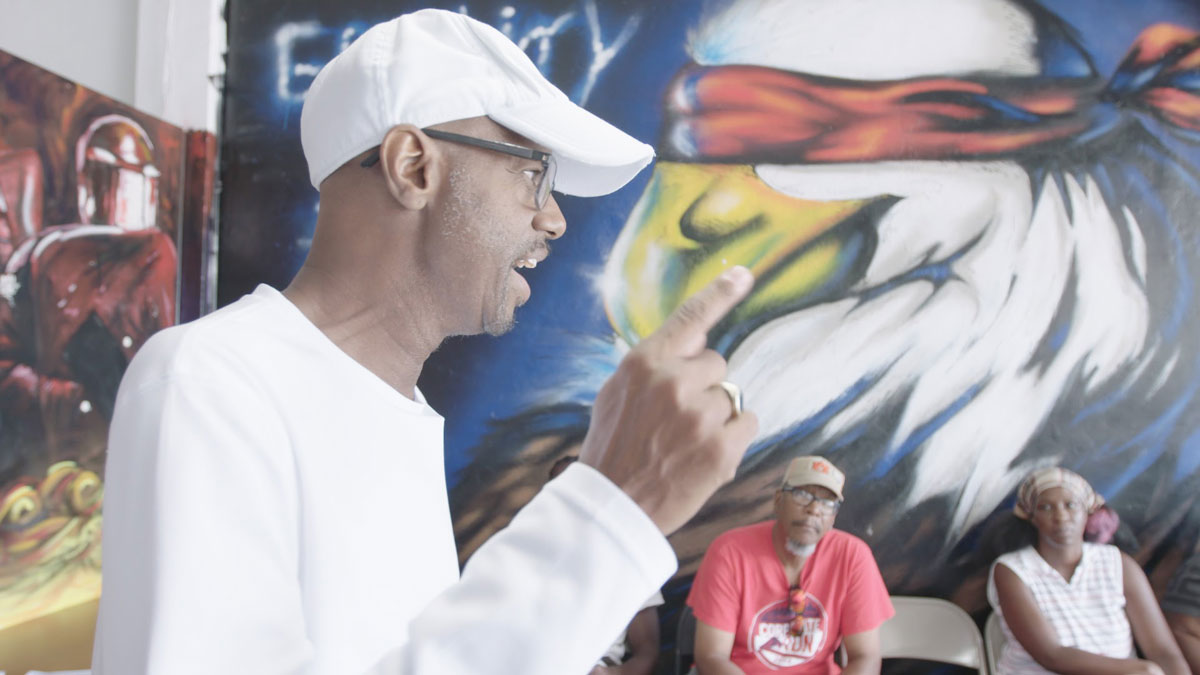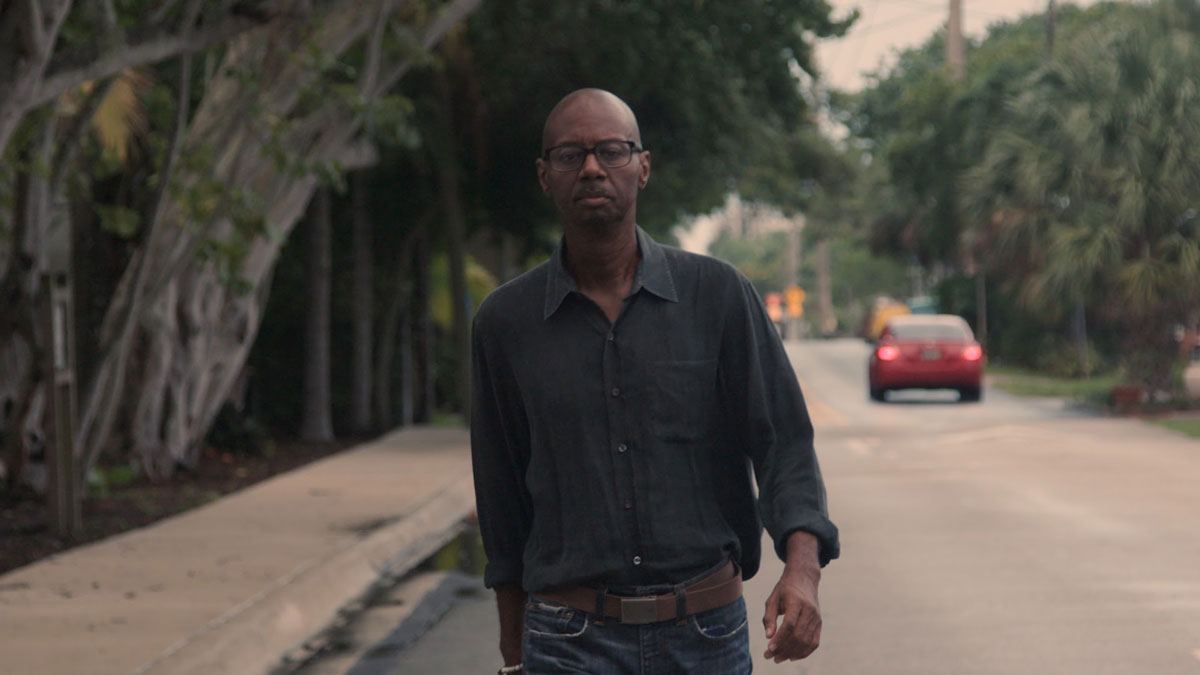By Alexandra Clinton
Florida Center for Investigative Reporting
For Roderick Kemp, an African-American living in Fort Lauderdale, the 2008 presidential election was a pivotal moment.
About This StoryThis story is a companion to “Unforgiven,” a web documentary produced by Alexandra Clinton and directed by Adeel Ahmed and Ashwin Gandbhir. Media PartnersThe Atlantic Miami Herald TIME |
That year, Kemp become an organizer for then-Sen. Barack Obama, and Obama’s historic election inspired Kemp to stay politically engaged in the years that followed through local and state campaigns.
The election of the first black president and the role political organizing played are both historic and emotional for Kemp, a calm and soft-spoken 60-year-old. He broke his usual ease at his home in Fort Lauderdale when he described attending the inauguration in Washington, D.C., in 2009.
“At that moment, I thought to myself, ‘Wow, this is what it’s like to be a part of effective change,’” Kemp recalled, fighting back tears.
Along with aiding in the president’s re-election campaign in Florida four years later, Kemp, a real estate agent, served on local boards, ran county commission and mayoral races, and managed a field office for Charlie Crist’s 2014 gubernatorial campaign. “It just seemed second nature to me that I need to be involved,” Kemp said.
By the time the 2016 election campaigns started, the question for Kemp was not if he would be involved in the 2016 election efforts, but how.
“My phone has been ringing off the hook from leaders of the Broward County Democratic Party asking me, ‘Are you ready? We need you,’ ” Kemp said.
But this year, Kemp’s involvement came to an abrupt halt. The Florida Division of Elections discovered a skeleton in his closet. Kemp received a brief letter from the Broward Supervisor of Elections informing him that the state of Florida had revoked his voting privileges due to a previous felony conviction.
In 1986, when Kemp was 29, he was arrested for cocaine possession. After violating the final portion of his parole by missing community service commitments, he served a few months in county jail.
Kemp never realized his voting rights could be taken away as a result. “I thought that once I served my time, I had paid my debt to society,” he said.
As a recreational drug user who used socially among friends, serving time shook him straight. Kemp decided to shut the door on that part of his life. “That was done. That was in the past,” he said.
Over the next 30 years, life fell into place. Kemp’s former boss re-hired him. He went on to become a father of three, a grandfather of two, and to have successful careers in business and real estate. He continued voting as he always had.
Then, seemingly out of nowhere, the letter arrived. Kemp was stunned. “This must be a mistake,” he thought.
It wasn’t.
“You have been convicted of a felony and your civil rights permitting you to vote have not been restored at this time,” the letter stated.
Kemp is one of an estimated 6.1 million Americans, and 1.7 million Floridians, who are disenfranchised due to felony convictions, according to a report released this month by the Sentencing Project, a Washington D.C.-based nonprofit focused on criminal justice issues.

Roderick Kemp has helped to collect thousands of signatures for a ballot initiative that would rewrite voter restoration laws. (Photo by Asad Faruqi/Surya Productions.)
When an individual is convicted of a felony in Florida, he or she loses the right to vote, sit on a jury, hold public office, and possess a firearm. This was, however, the first time Kemp was informed of the civil rights he had apparently lost back in 1986.
It remains unclear why Kemp’s ineligibility has only been brought to light recently. A spokesperson for the Florida Department of State maintained that the Division of Elections follows the process outlined in Florida law and in a manner consistent with the federal National Voter Registration Act, which includes monthly voter eligibility reports on the statewide roll.
What’s clear is that Florida is the national champion of voter disenfranchisement. More people are disenfranchised as a result of a felony conviction here than in any other state. Of the country’s total disenfranchised population, 27 percent lives in Florida.
“I immediately went into fight mode,” Kemp said after receiving the letter. “We’ve got to fix this.”
Kemp made calls and visited some of the lawmakers whom he helped elect, asking for their help. But then reality hit him. This wasn’t something a phone call could fix. This was going to be a fight.
Rights restoration practices vary widely by state, and Florida’s is among the toughest. To have his rights restored, Kemp is pursuing clemency — essentially a pardon granted during a hearing with the Florida Board of Executive Clemency. The board — which consists of Gov. Rick Scott, the state’s attorney general, chief financial officer and commissioner of agriculture — decides if the applicant is committed to living “crime-free,” and with a majority vote, if he or she is deserving enough to have civil rights restored.

Roderick Kemp filed his application for clemency earlier this year, but it will likely be years, maybe even a decade, before his case is heard. (Asad Faruqi/Surya Productions.)
Kemp’s tall, slender figure exudes confidence as he leads a group of young activists on an effort to register minority voters in North Miami on a humid Sunday in August.
“‘Excuse me,” Kemp said to an African-American woman outside of a supermarket. “Are you registered to vote?’”
For Kemp, voting is not just a right; it is a way of life. Over the past eight years, Kemp has gained respect and a sense of community within Florida’s Democratic Party. “On occasion, I’ve thought of running for office myself,” he said. “You can’t help but think of it when you’ve worked with people in office. People have asked me to run, and I have been close to doing it.”
It has become increasingly harder for ex-offenders to regain their voting rights since Gov. Scott took office. Politics have had a direct hand in shaping the yo-yo history of Florida’s rights-restoration process. Former Gov. Jeb Bush, a Republican, approved 76,736 cases during his eight years in office, and former Gov. Charlie Crist, a moderate Republican at the time and now a Democrat, passed reforms and restored rights to 155,315 ex-offenders during his four-year term.
Since Scott took office in 2011, just 2,340 cases have been approved.
“It just seems unfair,” Kemp said. “When you look at my record as someone who’s been involved in the process, I’m qualified. You took that qualification away from me for something that happened a lifetime ago.”
More than 10,000 applications wait to be heard by the Florida Board of Executive Clemency. The backlog seems by design. The board, which meets four times annually, has tasked itself with an insurmountable amount of work and cannot keep up with the thousands of new applications it receives.
Scott rarely comments on the process, but in March, an Orlando television news reporter asked the governor at a public event if he realized how difficult the clemency process had become.
“It’s not,” Scott said, shaking his head. “Just look at how many people are voting. We have plenty of turnout.”
“Felonies impact our communities more than other communities,” Kemp explained, referring to African-Americans. More than one in five African-Americans is disenfranchised in Florida — 21 percent of all African-Americans living in Florida. Three states have similarly high rates of African-American disenfranchisement: Kentucky (26 percent), Virginia (22 percent) and Tennessee (21 percent).
Kemp filed his application for clemency earlier this year, but it will likely be years, maybe even a decade, before his case is heard. “They told me to wait in line,” he said.
Any other year, Election Day holds a sense of pride for Kemp. This year, he will be absent from the polls. “I don’t have a voice. I’m like an anonymous person,” he said.
Some hope rests in activist Desmond Meade and his Florida Rights Restoration Coalition. Meade’s organization has collected 68,000 signatures for a ballot initiative that would rewrite voter restoration laws. The proposed constitutional amendment would automatically restore civil rights for nonviolent felons after they have completed their sentences.
Following review by the Supreme Court, the proposed amendment could be on the 2018 ballot.
In addition to helping log some of those thousands of signatures with the coalition, Kemp is looking inward as he waits for his day with the clemency board.
As a follower of Nichiren Buddhism, Kemp chants daily. Next to the altar where Kemp sits in peace, holding his prayer beads and preparing to begin his practice, there is a list of goals for 2016.
Among them: determination.
